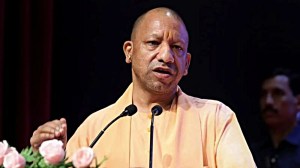US trying to cut through Indo-Pak fog
There is still evidence that infiltration across the Line of Control is continuing, said US Secretary of State Colin Powell, but added that ...

There is still evidence that infiltration across the Line of Control is continuing, said US Secretary of State Colin Powell, but added that Pak President General Pervez Musharraf had now given ‘‘more positive’’ assurances that it would stop.
And India has been asked to show ‘‘restraint’’ until ‘‘we can determine whether or nor infiltration activity has ended.’’ If this (the end of infiltration) could be verified by ‘‘everybody,’’ then New Delhi could be called upon to de-escalate. Ideally, this process should begin, Powell suggested, before the monsoon sets in later in the summer.
Powell’s message came in a detailed interview to the Public Broadcasting Service last night, the same day that President Bush cracked down hard on the General saying he had to ‘‘live up to his word.’’
|
|
|||
|
A roadmap for the next few days? According to Powell: |
|||
|
• 1 We are pressing Musharraf very hard to cease all infiltration activities on the part of terrorist organizations across the LoC |
‘‘We were receiving assurances from President Musharraf that infiltration activity across the LoC would be ended. But unfortunately we can still see evidence that it was continuing,’’ Powell said.
President Musharraf ‘‘has now given (an) assurance again and these assurances are more positive. We hope he is now giving the necessary orders and all necessary actions to stop infiltration,’’ he said.
‘‘If everybody can detect the end of this kind of infiltration activity, then we have a basis for calling upon the Indians to start moving in the other direction, with respect to their mobilisation and preparation for attack actions. ‘‘And so there is a sense of urgency, and there are also some issues as to when you actually … (undertake) such an operation before the monsoon season starts later in the summer,’’ Powell said. Again underlining the sense of urgency, he said: ‘‘That is why we are all involved—the European Union, bilaterally, with many of our friends.’’
Powell said he has spoken to the Chinese Foreign Minister ‘‘and I know that they have engaged themselves.’’
‘‘British Prime Minister Blair has been making calls. French President Jacques Chirac has been calling and UN Secretary General Kofi Annan has been making calls. So we are all heavily engaged in trying to find a way out of this crisis.’’ When asked about possible Indian action if it does not get evidence that infiltration has stopped, Powell said: ‘‘I would not presume to speak for the Indian goverment. It is always a political decision as to whether or not military action will be taken in a democracy such as India.
‘‘But I hope that as they examine the situation, and as they look at the consequences that could flow from such a decision, that they will exercise the maximum restraint while we wait and see what is happening over the line of control. And I still feel there is a way out of this crisis, and it need not result in war.’’
On the kind of role Washington could play in the crisis, Powell said: ‘‘I don’t think you can come up with any outside plan. I think the two sides have to discuss this with each other. I don’t think there is a role at this point for a mediator to come in from outside.’’
Replying to a question whether the US has a plan to resolve the Kashmir issue, he said: ‘‘I think this is something that has to be dealt with between the two sides, and outsiders can play a role in getting them talking to one another, and putting a process in place, but it is a plan that they will have to come up with.’’
Describing Kashmir as ‘‘a very sensitive issue between India and Pakistan,’’ Powell said that at present there was ‘‘nothing active’’ before the two countries to resolve the issue.
‘‘There are political consequences; there are religious issues involved in it. It has been an intractable problem for 50 years,’’ he said. ‘‘It has to do with the various populations that coexist within Kashmir. And they have never been able to find a political way to solve this difficult problem that really has been there since the formation of these two countries.’’ Asked about the stalled dialogue process between New Delhi and Islamabad, Powell said: ‘‘Well, they have had some bad experiences in recent years as they have tried to talk to one another.’’
‘‘They have had conferences—the Agra meeting a year or two ago did not turn out well, so there is a lack of trust between the two sides, a lack of good faith between the two sides on this issue, and we have got to get beyond that as well,’’ Powell said.
Stating that the US has good relations with both the countries, Powell said ‘‘We want to keep that going. It becomes immensely more difficult if they are involved in a conflict with each other, a conflict that does have the potential of becoming nuclear, even though we hope that everybody will realize it makes absolutely no sense. ‘‘And it also affects or could affect our campaign against terrorism and the work we are doing in Afghanistan with Operation Enduring Freedom.’’ He described Kashmir as ‘‘certainly one of the most dangerous places in the world.’’
‘‘I think the Middle East can also be seen as a very dangerous place, but even as dangerous as the Middle East is, the consequences that can flow from something in the Middle East don’t rise to the source of consequences that can flow from a conflict between India and Pakistan.’’
‘‘It is a very tense situation,’’ said Powell. ‘‘I can’t tell you how close to a war they might be. What we are trying to do is to make sure they never reach that point. We are pressing President Musharraf very hard to cease all infiltration activities on the part of terrorist organizations across the LoC and we are asking the Indians to show restraint until we can determine whether or not infiltration activity has ended.’’
‘‘And if infiltration activity has ceased,’’ said Powell, ‘‘there will be a basis for the Indians to reciprocate by starting to de-escalate, moving down the mobilization ladder, and then ‘‘hopefully, other actions and other steps can be taken after that.’’
‘‘So right now it is a tense situation. We are worried about it. That is why everybody is involved, the entire international community, and we are using all the tools available to us with visits, phone calls. The President (George W Bush) follows this situation on a daily basis. And my conversation with the leaders are on an almost every other day basis.’’
On the possibility of a nuclear war between India and Pakistan, he said: ‘‘In my conversations with both sides, especially with the Pakistani side, I have made it clear that this really can’t be in anyone’s mind, I mean, the thought of nuclear conflict in the year 2002.’’
‘‘And so I will continue to discuss with both sides now how important it is for us to start moving in the other direction and not toward conflict with all the unintended consequences that often come with conflict.’’ He replied in the negative when asked if the US had any assurance from either side that either one or both won’t end up using nuclear weapons. ‘‘It would be horrific in the year 2002 to see a second use of nuclear weapons in history. … And we do not want to even contemplate the use of nuclear weapons. And that is my message to both of them,’’ he said. (With PTI)
Photos


- 01
- 02
- 03
- 04
- 05





























